托福TPO15听力Conversation2文本+题目+答案解析
2015年10月25日托福听力真题及答案解析
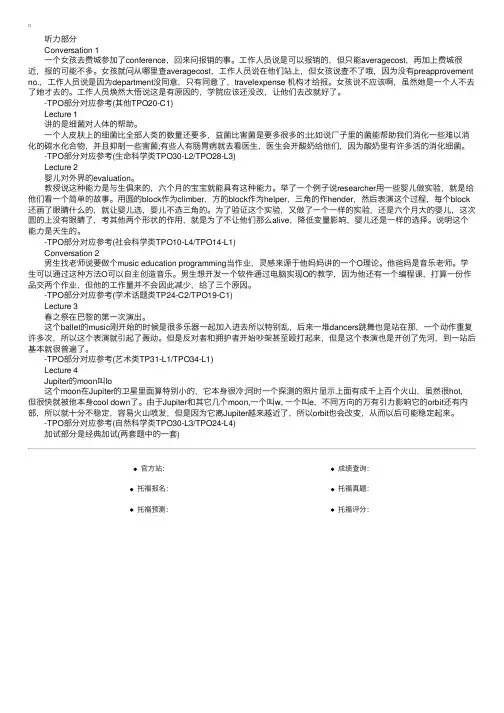
听⼒部分 Conversation 1 ⼀个⼥孩去费城参加了conference,回来问报销的事。
⼯作⼈员说是可以报销的,但只能averagecost,再加上费城很近,报的可能不多。
⼥孩就问从哪⾥查averagecost,⼯作⼈员说在他们站上,但⼥孩说查不了哦,因为没有preapprovement no.,⼯作⼈员说是因为department没同意,只有同意了,travelexpense 机构才给报。
⼥孩说不应该啊,虽然她是⼀个⼈不去了她才去的。
⼯作⼈员焕然⼤悟说这是有原因的,学院应该还没改,让他们去改就好了。
-TPO部分对应参考(其他TPO20-C1) Lecture 1 讲的是细菌对⼈体的帮助。
⼀个⼈⽪肤上的细菌⽐全部⼈类的数量还要多,益菌⽐害菌是要多很多的;⽐如说⼚⼦⾥的菌能帮助我们消化⼀些难以消化的碳⽔化合物,并且抑制⼀些害菌;有些⼈有肠胃病就去看医⽣,医⽣会开酸奶给他们,因为酸奶⾥有许多活的消化细菌。
-TPO部分对应参考(⽣命科学类TPO30-L2/TPO28-L3) Lecture 2 婴⼉对外界的evaluation。
教授说这种能⼒是与⽣俱来的,六个⽉的宝宝就能具有这种能⼒。
举了⼀个例⼦说researcher⽤⼀些婴⼉做实验,就是给他们看⼀个简单的故事。
⽤圆的block作为climber,⽅的block作为helper,三⾓的作hender,然后表演这个过程,每个block 还画了眼睛什么的,就让婴⼉选,婴⼉不选三⾓的。
为了验证这个实验,⼜做了⼀个⼀样的实验,还是六个⽉⼤的婴⼉,这次圆的上没有眼睛了,考其他两个形状的作⽤,就是为了不让他们那么alive,降低变量影响,婴⼉还是⼀样的选择。
说明这个能⼒是天⽣的。
-TPO部分对应参考(社会科学类TPO10-L4/TPO14-L1) Conversation 2 男⽣找⽼师说要做个music education programming当作业,灵感来源于他妈妈讲的⼀个O理论。
托福TPO50听力Conversation2文本+题目+答案解析
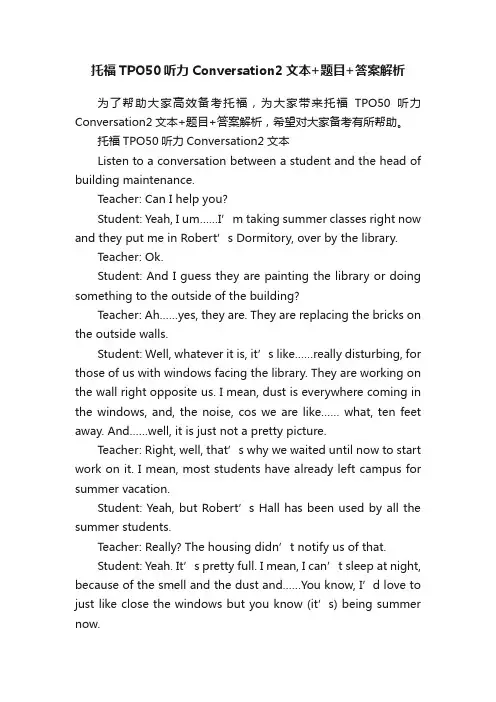
托福TPO50听力Conversation2文本+题目+答案解析为了帮助大家高效备考托福,为大家带来托福TPO50听力Conversation2文本+题目+答案解析,希望对大家备考有所帮助。
托福TPO50听力Conversation2文本Listen to a conversation between a student and the head of building maintenance.Teacher: Can I help you?Student: Yeah, I um……I’m taking summer classes right now and they put me in Robert’s Dormitory, over by the library.Teacher: Ok.Student: And I guess they are painting the library or doing something to the outside of the building?Teacher: Ah……yes, they are. They are replacing the bricks on the outside walls.Student: Well, whatever it is, it’s like……really disturbing, for those of us with windows facing the library. They are working on the wall right opposite us. I mean, dust is everywhere coming in the windows, and, the noise, cos we are like…… what, ten feet away. And……well, it is just not a pretty picture.Teacher: Right, well, that’s why we waited until now to start work on it. I mean, most students have already left campus for summer vacation.Student: Yeah, but Robert’s Hall has been used by all the summer students.Teacher: Really? The housing didn’t notify us of that.Student: Yeah. It’s pretty full. I mean, I can’t sleep at night, because of the smell and the dust and……You know, I’d love to just like close the windows but you know (it’s) being summer now.Teacher: Yes, I know. There is no air-conditioning in that building.Student: Right! So I mean, we got five more weeks of classes left, and we were really wondering how much longer they are going to be working on that particular wall. Because maybe it’s going to be a while.Do you think they could maybe work on a different side of the building for now, one that's not facing people’s dorm rooms, and wait until the students are gone? To come back and finish this side? I mean, that way the dust and noise won’t be coming directly into our windows while we are here.Teacher: You know, I wish it weren’t being done this way and it doesn’t make sense. But……this p articular decision was made by a special committee and their plan was finalized several months ago. They just didn’t realize there would be students in Robert’s Hall now.Student: Yeah.Teacher: Plus, well, the equipment is all set up, you know, the scaffolding is up on that side of the building and……oh it just won’t be practical to have the construction workers move everything to another side and leave a whole side of the library all torn out like that.Student: I guess not. Isn’t there another dorm open anywhere?Teacher: Not that I know. Oh, wait. I overheard someone saying today that Manchester Hall isn’t being used by the city’s summer camp after all. You know, most years they house their participants in that dorm all summer.Student: Well, there is an idea.Teacher: Now it’s a smaller dorm and it’s a little out of theway but……well, I bet……I bet they could move the affected student from Robert’s Hall.Student: Wow, I think a lot of people would definitely appreciate that.Teacher: Ok, well, let me call the housing people and I will get back to you. Leave your name and number, ok? And I will let you know what I find out.Student: Great. Thanks.托福TPO50听力Conversation2题目1.What problem is the student having?A. His dormitory is in need of repairs.B. He does not have summer housing.C. He is bothered by construction on campus.D. He is not able to use the university library.2.What does the student suggest that the construction workers do?。
托福TPO17听力Conversation2文本+题目+答案解析
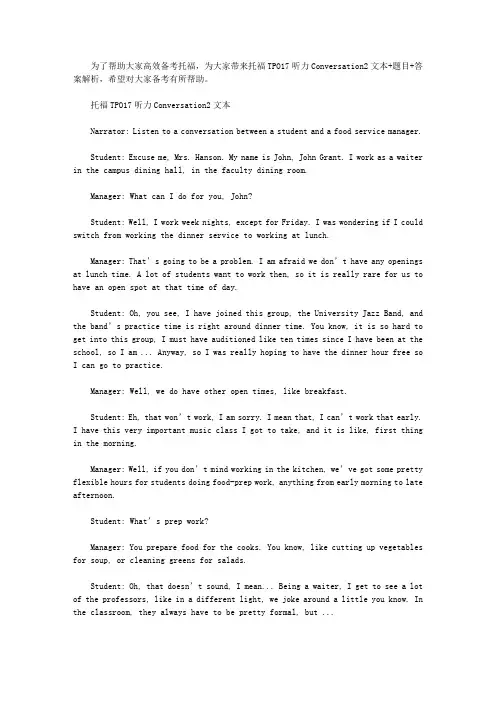
为了帮助大家高效备考托福,为大家带来托福TPO17听力Conversation2文本+题目+答案解析,希望对大家备考有所帮助。
托福TPO17听力Conversation2文本 Narrator: Listen to a conversation between a student and a food service manager. Student: Excuse me, Mrs. Hanson. My name is John, John Grant. I work as a waiter in the campus dining hall, in the faculty dining room. Manager: What can I do for you, John? Student: Well, I work week nights, except for Friday. I was wondering if I could switch from working the dinner service to working at lunch. Manager: That’s going to be a problem. I am afraid we don’t have any openings at lunch time. A lot of students want to work then, so it is really rare for us to have an open spot at that time of day. Student: Oh, you see, I have joined this group, the University Jazz Band, and the band’s practice time is right around dinner time. You know, it is so hard to get into this group, I must have auditioned like ten times since I have been at the school, so I am ... Anyway, so I was really hoping to have the dinner hour free so I can go to practice. Manager: Well, we do have other open times, like breakfast. Student: Eh, that won’t work, I am sorry. I mean that, I can’t work that early.I have this very important music class I got to take, and it is like, first thing in the morning. Manager: Well, if you don’t mind working in the kitchen, we’ve got some pretty flexible hours for students doing food-prep work, anything from early morning to late afternoon. Student: What’s prep work? Manager: You prepare food for the cooks. You know, like cutting up vegetables for soup, or cleaning greens for salads. Student: Oh, that doesn’t sound, I mean... Being a waiter, I get to see a lot of the professors, like in a different light, we joke around a little you know. In the classroom, they always have to be pretty formal, but ... Manager: Well, the money is no different since we pay students the same amount for any of the jobs here in food service, so it’s up to you. Student: Oh, man. I always thought that sacrificing for my art, that’d mean working long hours as a musician for, like, no money. I didn’t think it’d mean, peeling carrots. Manager: Let me see, I am offering you something that has the hours you want, it is right here on campus, and you make as much money as you did being a waiter, quite a sacrifice. Student: I am sorry, I know you are just trying to help. I guess I should look into the food-prep job. Manager: Ok, then, I’ll tell the kitchen manager that you will stop by tomorrow to talk about the job and schedule your hours. And I will let the dining hall manager know that he needs to find a new waiter for the evening. Student: Oh, ok, I guess that’s it. Thanks, Mrs. Hanson. 托福TPO17听力Conversation2题目 1.Why does the man go to see the woman? A. To complain about rude customers. B. To request an increase in his pay. C. To ask for a change in his work schedule. D. To apply for a job playing music in the dining hall. 2.What activity does the man want to be able to do at dinnertime? A. Prepare for his morning music classes. B. Rehearse with a school music group. C. Play jazz for the faculty in the dining hall. D. Eat with classmates from his music class. 3.The woman asks the man to consider a different job What kind of work would the man have to do for the new job?。
托福TPO2听力Conversation2文本+题目+答案解析
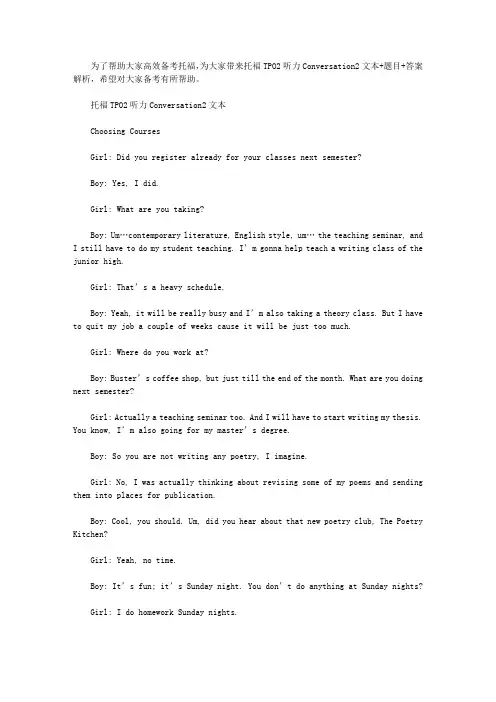
为了帮助大家高效备考托福,为大家带来托福TPO2听力Conversation2文本+题目+答案解析,希望对大家备考有所帮助。
托福TPO2听力Conversation2文本 Choosing Courses Girl: Did you register already for your classes next semester? Boy: Yes, I did. Girl: What are you taking? Boy: Um…contemporary literature, English style, um… the teaching seminar, and I still have to do my student teaching. I’m gonna help teach a writing class of the junior high. Girl: That’s a heavy schedule. Boy: Yeah, it will be really busy and I’m also taking a theory class. But I have to quit my job a couple of weeks cause it will be just too much. Girl: Where do you work at? Boy: Buster’s coffee shop, but just till the end of the month. What are you doing next semester? Girl: Actually a teaching seminar too. And I will have to start writing my thesis. You know, I’m also going for my master’s degree. Boy: So you are not writing any poetry, I imagine. Girl: No, I was actually thinking about revising some of my poems and sending them into places for publication. Boy: Cool, you should. Um, did you hear about that new poetry club, The Poetry Kitchen? Girl: Yeah, no time. Boy: It’s fun; it’s Sunday night. You don’t do anything at Sunday nights? Girl: I do homework Sunday nights. Boy: Well, it’s only from 7 to 9. Girl: Is it every Sunday? Boy: Last Sunday of every month. I don’t know about this month, cause it’s probably a little too close to Thanksgiving, so they might move it up. I don’t know what they are gonna to do, but it’s a good time, it’s fun, some really impressive readings. Girl: Who? From our class? Boy: Some people from our class are reading. A lot of them go, sometimes even the professor. Girl: Really? I don’t know if I would want to read in front of her. Boy: You wouldn’t have to read, you can just watch. I just watched the first time, but it’s a good environment to read them, I think anyway. Girl: I probably have to write something new, so maybe during the summer, I just can’t now. Boy: Yeah, it wouldn’t be the same just reading old stuff. Are you going to do summer school? Girl: Definitely, otherwise, I will be short 6 credits. I have no choice. Boy: Yeah, me too. This is the second summer. I’ll have to take classes. I gotta go now, my Shakespeare class starts in twenty minutes. 托福TPO2听力Conversation2题目 1.What are the students mainly discussing? a) Their courses for next semester b) Their plans for the weekend c) A poetry club d) A class assignment 2.What does the man plan to do at the end of the month?。
TPO15-L2托福
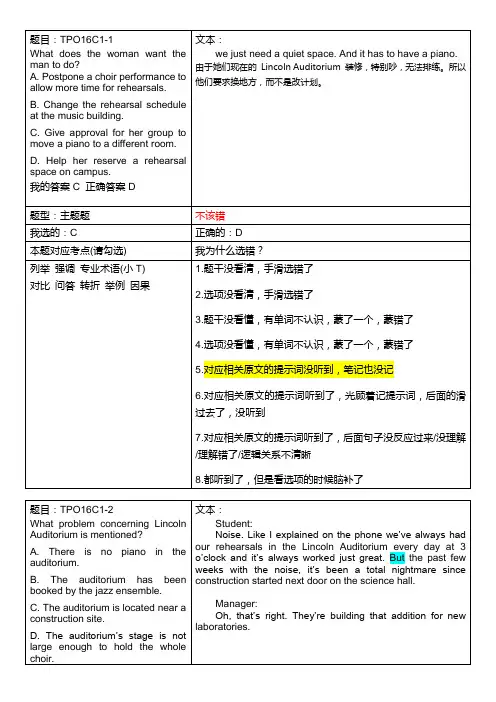
TPO 16Conversation1Narrator:Listen to a conversation between a Student and a facilities Manager at the university. Student:Hi. I’m Melanie, the one who’s been calling.Manager:From the singing group, right?Student:From the choir.Manager:Right, the choir. It’s nice to finally meet you in person. So, you are having problems with...Student:Manager:Oh, that’s right. They’re building that addition for new laboratories.Q2Student:Exactly. Anyway, ever since they started working on it, it’s been so noisy we can barely hear ourselves think.Manager:Let alone sing.Student:Forget about singing. I mean, we keep the windows down and everything, but once those bulldozers get going, I mean those machines are loud. We’ve already had to cut short two rehearsals and we’ve got a concert in 6 weeks.Manager:Well, that’s not good. I’m assuming you’ve tried to reschedule your rehearsals. They don’t do construction work at night.Student:I ran that by the group, but there were just too many... I mean evenings are really hard. It seems like everyone in the choir already has plans and some even have classes at night.Q3 Manager:And what about the music building?Auditorium seemed like a reasonable idea.Student:All that noise. I don’t know. I just wonder if the jazz ensemble knew what was going to happen.Manager:Well, that wouldn’t be very nice.Student:now the music building’s fully booked, mornings, afternoons, everything, we just need a quiet space. And it has to have a piano.Q1 Manager:A piano. Of course some of the other auditoriums have pianos, but that’s not going to beeasy.Student:You think they’re pretty booked up?Manager:Probably. But it can’t hurt to check. What about Bradford Hall? I remember a piano inthe old Student center there.Student:At this point, we’d be grateful for any quiet place.Manager:Can you... How flexible can you be on times? You said no evenings, but what if can’t find something open at 3 o’clock? Can you move earlier or later?go much outside that.Q5Manager:Well, check with me tomorrow morning. I should’ve found something by then. It mightnot be ideal...Student:As long as it’s got a piano and nobody’s putting up a building next door, we’ll be happy.。
tpo-15听力题目
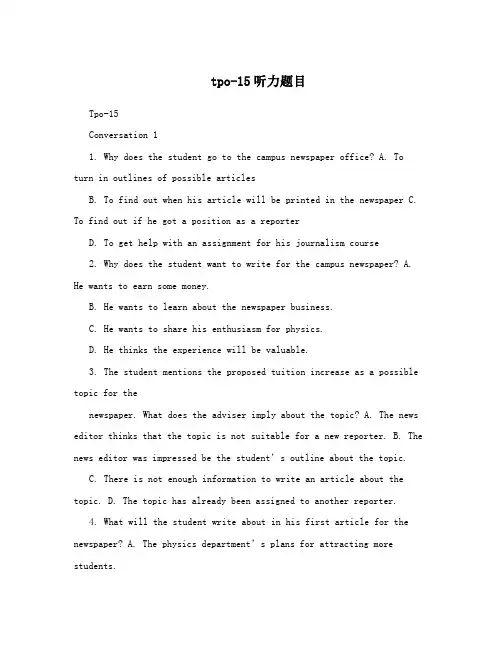
tpo-15听力题目Tpo-15Conversation 11. Why does the student go to the campus newspaper office? A. To turn in outlines of possible articlesB. To find out when his article will be printed in the newspaperC. To find out if he got a position as a reporterD. To get help with an assignment for his journalism course2. Why does the student want to write for the campus newspaper? A. He wants to earn some money.B. He wants to learn about the newspaper business.C. He wants to share his enthusiasm for physics.D. He thinks the experience will be valuable.3. The student mentions the proposed tuition increase as a possible topic for thenewspaper. What does the adviser imply about the topic? A. The news editor thinks that the topic is not suitable for a new reporter. B. The news editor was impressed be the student’s outline about the topic.C. There is not enough information to write an article about the topic.D. The topic has already been assigned to another reporter.4. What will the student write about in his first article for the newspaper? A. The physics department’s plans for attracting more students.B. The university’s plan to offer more physics course.C. The importance of physics in our daily lives.D. The opinions of professors on the recent changes to introductory physics courses.5. What does the adviser imply when she says this:A. She is not responsible for evaluating proposed articles.B. She did not tell Max about the student’s interest in joining the staff.C. Max recently became the editor of the newspaper.D. Max has been very busy lately.Lecture 16. What is the lecture mainly about?A. Methods people used to eliminate distractions.B. The area of the brain responsible for blocking distractionsC. The usefulness of questionnaires in assessing distractability.D. Research about how the brain deals with distractions.7. According to the professor, what are two weaknesses of the Cognitive Failures Questionnaire? Click on 2 answers.A. It relies on subjective reporting.B. It assesses a limited number of situations.C. It does not assess visual distractionsD. It does not account for factors other than distractability.8. What hypotheses about distraction and brain were Lavie’s experiments involvingstar fields designed to investigate? Click on two answers. A.Whether the capacity of the brain to process irrelevant information varies from person to person.B. Whether the brain perceives information that is irrelevant to the performance of a task.C. Whether the brain deals with distractions by categorizingirrelevant information aslow priority.D. Whether the visual cortex is activated during the sensation of movement.9. What did Lavie’s scans of subjects’ visual cortexes reveal?A. Area V5 became less active when tasks became more difficult.B. The presence of the star field did not affect activity in area V5.C. Area V5 became more active as more information appeared on the screen.D. Stimulating area V5 interfered with subjects’ ability to perceive motion.10. Why does the professor mention a highway?A. To compare two experiments designed to study distraction.B. To give an example of when area V5 might be activated.C. To describe a limitation in the brain’s processing capacity.D. To make a point about the effect of distractions on driving.11. What is professor’s opinion of Lavie’s work?A. She thinks it resolves most of the major questions about distraction.B. She feels it is of limited use because of flaws in thestudy designs. C. She believes it has changed the direction of researchon distraction. D. She thinks its findings can be applied only to visual distraction.Lecture 212. What is the lecture mainly about?A. Recognizing when one geologic epoch ends and another begins.B.How geologists determine the age of earth.C. Whether humans have affected earth’s climateD. Identifying elements that affect the formation of sediment layers.13. Why does the professor mention the Pleistocene epoch?A. To explain how sediments change during an ice age.B. To give an example of a well-defined geologic epochC. To describe how certain environmental conditions affect erosion rates.D. To describe the factors that influence the naming of geologic epochs.14. Researchers study sediment in order to learn about the characteristics of pastgeologic epochs. What does the professor say that sediment reveals about aparticular epoch? Click on two answers.\A. The climate on earth when the sediment formed.B. The places on earth with the highest amounts of rainfall.C. The level of the oceans at the time.D. The organisms that lived when the sediment formed.15. According to the professor, what is the significance of the year 1800C.E? A. The population reached 1 billion.B. The Anthropocene epoch was first described.C. Industrialization began to influence earth’s environment.D. There was a significant change in the amount of sediment deposited around theworld.16. What does the professor imply about the spread of agriculture 8,000 years ago? A. It was the true beginning of the Holocene epoch.B. It was the greenhouse gases were at their lowest levels.C. It was not a major cause of population growth.D. It did not cause as big an environmental impact as some researchers say.17. What does the professor say about future researchers?A. They may not agree that human have had an important effect on earth’s surface.B. They will not have reliable evidence of what is happening today.C. They will determine when the Anthropocene epoch began.D. They will make predictions about when the Anthropocene epoch will end.Part 2Conversation 21. Why does the woman go to see her professor?A. To tell him about an athletic achievement.B. To find out the best approach to studying for a test.C. To ask a question about a laboratory project.D. To discuss her performance on a biology exam.2. What does the professor imply when he mentions his experience playing soccer incollege?A. The woman should participate in a sport that takes less of her time.B. The woman may not have enough time to study for her class.C. The woman is not trying hard enough to do well in the class.D. The woman should be satisfied with the results of her exam.3. What did the woman study in her laboratory project?A. The best methods for preserving samples of onion cells.B. The differences between onion cells and other plant cells.C. The process of cell division in an onion.D. The different ways that onion cells can be diagrammed.4. What does the professor say about the results of the brain research? A. Several short study sessions are more effective than one extended study session. B. Studying in the library increase the brain’s ability to absorb details.C. Studying for extended periods of time is good exercise for the brain.D. Students who excel at laboratory work usually perform well on exams.5. At the end of the conversation, why does the professor return to the topic of runningon the track team?A. To suggest that the student take a break from it for a few weeks.B. To give an example of how exercise affects memory.C. To illustrate the point he is making about study habits.D. Tofind out if the next track meet will interfere with the exam.Lecture 36. What is the lecture mainly about?A. How Archimedes was identified as the author of some ancient texts.B. The recovery of some ancient writings on mathematics.C. Differences among various writing materials used in the Middle Ages.D. Techniques for restoring ancient manuscripts.7. What are two points the professor makes about parchment? Click on two answers. A. It is more long lasting than paper.B. It was inexpensive to produce during the Middle Ages.C. It was the material Archimedes used for his writings.D. Its use for books decreased after the 1400s.8. What does the professor imply when he explains the washing and scraping methodsthat were used to remove ink from parchment surface?A. Washing made parchment more able to retain newly applied ink than scraping did.B. Washing was less effective than scraping as means of permanently erasing ink.C. The scraping method was used in the creation of the Archimedes palimpsest.D. Neither method completely erased the original text.9. What type of book became known as the Archimedes palimpsest?A. A history book.B. A physics book.C. A prayer book.D. An artist’s book.10. What does the professor imply about the various techniques used to viewArchimedes’ text?A. The students should be familiar with most of the techniques.B. Different techniques were used to analyze the iron content of ancient ink.C. The use of ultraviolet light was more damaging than the other techniques.D. X-ray image was more effective than the other techniques.11. What does the professor imply about the significance of the Archimedes palimpsest?A. It is significant because it contains what may be Archimedes’ most importantwork.B. It is significant because it proves that a certain mathematics text was written byArchimedes.C. It is significant because it is the oldest one ever discovered.D. It is significant because it is the first one to be completely deciphered.12. Why does the professor discuss the exploration of hydrothermal vents?A. To show how the exploration helped researchers to determine the compositionof ocean water.B. To show how the exploration challenged an assumption about biologicalcommunities.C. To compare two competing theories concerning chemosynthesis.D. To compare the life cycle of underwater plants to the life cycle of underwateranimals.13. What are three of the conditions of water near hydrothermal vents that made researchers think they would not find living organisms there? Click on 3 answers A. Extreme heatB. Extreme pressureC. Fast currentsD. Lack of mineralsE. Lack of sunlight14. What does the professor imply about the researchers’ reaction to the biologicalcommunity discovered on the ocean floor?A. They were surprised at the large variety of organisms living nearhydrothermal vents.B. They were surprised to find any bacteria living without sunlight.C. They were disappointed at not finding any animal life.D. They could not agree on the significance of the data that they collected.15. According to the professor, what is the role of chemosynthesisin biological communities that are found hydrothermal vents?A. It enables organisms to convert hydrogen sulfide into food.B. It enables organisms to convert tiny amounts of light into energy.C. It enables organisms to withstand large amounts of carbon dioxide.D. It enables organisms to regulate their temperature.16. Why does the professor mention the bacteria that live inside a tube worm? A. To give an example of organisms that pose a threat to tube worms. B. To explain what provides the organic material that tube wormsuse for energy. C. To give an example of other organisms that can withstand extreme heat. D. To give an example of organisms that are involved in both chemosynthesis andphotosynthesis.17. What does the professor imply when she says this:A. She will review information from the assigned chapter.B. She will present additional information related to the assigned chapter.C. The quiz on the assigned chapter will be longer than other quizzes.D. The class has spent too much time on the assigned chapter.。
托福听力对话conversation常见12类出题点归纳分享
托福听力对话conversation常见12类出题点归纳分享(经典版)编制人:__________________审核人:__________________审批人:__________________编制单位:__________________编制时间:____年____月____日序言下载提示:该文档是本店铺精心编制而成的,希望大家下载后,能够帮助大家解决实际问题。
文档下载后可定制修改,请根据实际需要进行调整和使用,谢谢!并且,本店铺为大家提供各种类型的经典范文,如工作报告、工作计划、活动方案、规章制度、演讲致辞、合同协议、条据文书、教学资料、作文大全、其他范文等等,想了解不同范文格式和写法,敬请关注!Download tips: This document is carefully compiled by this editor. I hope that after you download it, it can help you solve practical problems. The document can be customized and modified after downloading, please adjust and use it according to actual needs, thank you!Moreover, our store provides various types of classic sample essays, such as work reports, work plans, activity plans, rules and regulations, speeches, contract agreements, documentary evidence, teaching materials, complete essays, and other sample essays. If you would like to learn about different sample formats and writing methods, please pay attention!托福听力对话conversation常见12类出题点归纳分享比起听不懂,记不住可能是托福考生在面对托福听力时更为常见的出错原因。
托福听力TPO学习宝典
Solution No.2
TheEffect of mountains and lands,i.e. Topography
Lake-effect snow
E.G. Great Lakes
The forming of clouds
The forming of snow
Closing
Talk to the boss
TPO18conversation1student—administrator—help
Structure
Student
Librarian
Opening
Transfer from Chicago
Interested intheprogram
International studies
TPO 20 conversation 1 Student—Librarian—help
Structure
Student
Librarian
Opening
Problem
Asked to return the book
To keep the book for thesis
Backgrounddetails
Prominentalumni
Advanced math course
TPO 21conversation 2student—professor—question
Structure
Student
Librarian
Opening
Learn a lot from the lecture
Work in the field
TPO文章结构—conversation
托福TPO15听力Conversation1文本+题目+答案解析
为了帮助大家高效备考托福,为大家带来托福TPO15听力Conversation1文本+题目+答案解析,希望对大家备考有所帮助。
托福TPO15听力Conversation1文本 Narrator: Listen to a conversation between a student and the faculty adviser of the campus newspaper. Man: Hi, I talked to someone on the phone a couple of weeks ago. Anna, I think it was? Woman: I am Anna, the faculty adviser. Man: Oh, great! I’m Peter Murphy. You probably don’t remember me, but … Woman: No, no, I remember you. You were interested in working for the paper. Man: Yeah, as a reporter. Woman: That’s right. Uh, you’re taking a journalism class and you’ve done some reporting before in high school, right? Man: Wow, you have a good memory. Woman: Well, we haven’t had many students applying lately. So, anyway, you still want to do some reporting for us? Man: Yeah, if you have room for me on the staff. Woman: Well, we always need more reporters, but you know we don’t pay anything, right? Man: Yeah, I know. But I, uh, I’d like the experience. It will look good on my resume. Woman: Absolutely! Let’s see. I think I told you that we ask prospective reporters to turn in some outlines for possible articles? Ma: Yeah, I sent them in about a week ago. But I haven’t heard anything back yet, so, so I thought I’d stop by and see, but I guess you haven’t looked at them yet. Woman: Oh, Max, the news editor, he looks at all the submissions. Man: Oh, so he hasn’t made any decision about me yet? Woman: Well, I just got here a few minutes ago, haven’t been in for a couple of days. Uh, just give me a second to check my email. Uh, here’s a message from Max. Let’ see. Well, it seems you’ve really impressed him. He says it’d be wonderful if you could join our staff. Man: Oh, great! When can I start? Woman: Well, you turned in an outline on something to do with the Physics Department? Man: Yeah. They’re trying to come up with ways to get more students to take their introductory courses. Woman: Right. Well, apparently nobody else is covering that story so he wants you to follow up on it. Man: OK. Uh, what about the other outline I sent in? About the proposed increase in tuition fee? Woman: Oh, it looks like we’ve got that covered. Man: So, I’m starting with an article about the Physics Department. I guess I’d better get to work. Do you have any advice on how I should cover the story? Woman: Well, Max wanted to talk to you, but, I’m sure he’ll tell you to find out things like why the Physics Department worried about enrollment. Has the number of students been getting smaller in recent years? By how much? What kinds of plans they’re considering to address this problem? Man: Right. Some of those issues are already in what I proposed. Woman: And you want to do some interviews: you know, what the professors think of the plans, what the students think. You get the idea, but… Man: But wait till I talk to Max before proceeding? Woman: Right, he’ll cover everything you need to know to be a reporter for us. Can you come back this afternoon? He’ll be here until five o’clock. 托福TPO15听力Conversation1题目 1.Why does the student go to the campus newspaper office?。
托福(听力)历年真题试卷汇编2(题后含答案及解析)
托福(听力)历年真题试卷汇编2(题后含答案及解析) 题型有:1. Listening ComprehensionSection One:Listening Comprehension听力原文:Listen to a conversation between a student and his studio art professor.S: Professor Jones, good morning! Could I talk with you for a minute?P: Sure, Marty. What’s up? Is it about the class assignment this week?S: No, no... I’m almost done... really enjoying it.P: I’m glad to hear that.S: So, well, I’ve been talking to some of the other students in our studio art class and we were wondering who to talk to about maybe buying art supplies that are more environmentally safe for the art classes.P: Well, that’d be me. As the chair of the art department, I do have a say in purchasing decisions, but of course all decisions are voted on by the department faculty. You know... we already buy some eco-friendly products, for example, the easels in your painting studio. They’re made of wood from a South American eucalyptus tree. The trees grow really fast and new trees grow from the stumps of trees that have already been harvested. This is a great renewable resource.S: I didn’t know that. That’s fantastic! We are also considering drawing paper and pencils. There are some really cool companies that use recycled paper to make drawing paper and some pencil companies that make greener products out of wood from sustainable forests.P: Well, I can see you’ve done some research. Why don’t you write up a proposal? You can give us a list with the prices of the eco-friendly supplies you’d like the department to consider, and the faculty can compare that to the current cost of supplies at our next meeting.S: Oh, yeah ... I can appreciate that decisions will also be affected by the cost.P: Well, yes...that’s partly true. Of course, we have a budget for supplies and most of that money has been spent for this year, but you know, the university has been allocating additional funds for more eco-friendly practices. It’s part of their new ‘green campus’initiative.S: Yeah, the solar panels were recently installed on the roof of my dorm, and actually I read an article about the initiative in the campus newspaper. There’s a committee... I even heard there’s student representation that help in decision making related to the implementation of the university’s environmentally friendly practices.P: That’s right! The Green Committee and the solar panels you mentioned are just one of the many things they’ve done. So, I don’t know... given the university’s commitment to becoming more environmentally friendly and the fact that the university does receive partial funding from the state government to support this initiative... you never know!S: Ok... urn, when do you want the figures?P: Well, the next meeting of the art department faculty is at the beginning of next month. That gives you about three weeks.S: That should be enough time. We’ll get to work on it right away. Thanks for your help!1.Why does the student go to see the professor?A.To ask whether students can be represented at an upcoming faculty meeting B.To propose changing the kinds of supplies the art department usesC.To discuss an art project inspired by environmental concernsD.To complain about the lack of materials available to art students正确答案:B解析:目的主旨题。
- 1、下载文档前请自行甄别文档内容的完整性,平台不提供额外的编辑、内容补充、找答案等附加服务。
- 2、"仅部分预览"的文档,不可在线预览部分如存在完整性等问题,可反馈申请退款(可完整预览的文档不适用该条件!)。
- 3、如文档侵犯您的权益,请联系客服反馈,我们会尽快为您处理(人工客服工作时间:9:00-18:30)。
为了帮助大家高效备考托福,为大家带来托福TPO15听力Conversation2文本+题目+答案解析,希望对大家备考有所帮助。
托福TPO15听力Conversation2文本
Narrator: Listen to part of a conversation between a student and her biology professor.
Professor: Hi, Samantha, how did your track meet go?
Student: Great! I placed first in one race and third in another.
Professor: Congratulations, you must practice a lot.
Student: Three times a week pre-season, but now that we are competing every weekend. We practice six days a week from 3:30 to 5.
Professor: Athletics places a heavy demand on your time, don’t they?
Student: Yeah, but I really love competing, so…
Professor: You know, I played soccer in college and my biggest challenge, and I didn’t always succeed, was getting my studying in during soccer season. Are you having a similar?
Student: No. I really do make time to study, and I actually study more for this class than I do for all my other classes. But I didn’t see the grade I expected on my mid-term exam which is why I came by.
Professor: Well, you didn’t do badly on the exam but I agree it did not reflect your potential. I say this because your work on the lab project was exemplary. I was so impressed with the way you handled the microscope and the samples of onion cells and, well, how careful you observed and diagramed and interpreted each stage of cell division, and I don’t think you could have done that if you hadn’t understood the chapter. I mean, it seemed you really had a good understanding of it.
Student: I thought so, too. But I missed some questions about cell division on the exam.
Professor: So, what happened?
Student: I just sort of blanked out, I guess. I had a hard time remembering details. It was so frustrating.
Professor: All right. Let’s back up. You say you studied. Where? At home?
Student: At my kitchen table, actually.
Professor: And that’s supposed to be a quiet environment?
Student: Not exactly. My brother and parents try to keep it down when I’m studying but the phone pretty much rings off the hook, so.
Professor: So you might try a place with fewer distractions, like, the library.
Student: But the library closes at midnight and I like to study all night before a test. You know, so everything is fresh in my mind. I studied six straight hours the night before the mid-term exam. That’s why I expected to do so much better.
Professor: Oh, OK. You know that studying six consecutive hours is not equivalent to studying one hour a day for six days.
Student: It isn’t?
Professor: No, there’s a research that shows that after an hour of intensive focus, your brain needs a break. It needs to, you know, shift gears a little. Your brain’s ability to absorb information starts to decline after about the first hour. So if you are dealing with a lot of new concepts and vocabulary, anyway, if you just review your notes even twenty minutes a day, it’d be much better than waiting until the night before the exam to try and absorb all those details.
Student: Oh, I didn’t realize.
Professor: Think of your brain as a muscle. If you didn’t practice regularly with your track team, and then try to squeeze in three weeks’ worth of running practice the day before a track meet, how well do you think you will perform in the races?
托福TPO15听力Conversation2题目
1.Why does the woman go to see her professor?
A. To tell him about an athletic achievement.
B. To find out the best approach to studying for a test.
C. To ask a question about a laboratory project.。
